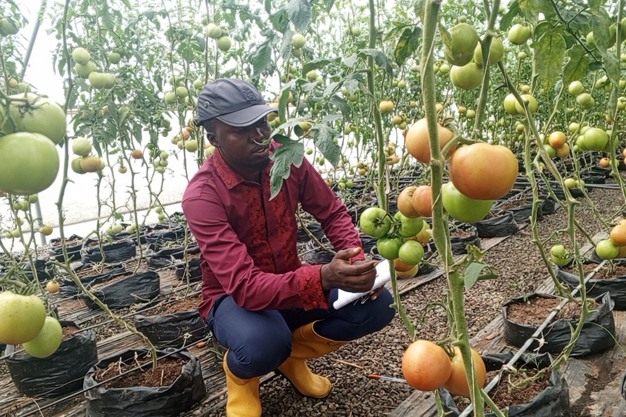Greenhouse cultivation is promising for enhancing food production, and Nigeria is starting to benefit from these developments. Kola Olatunji, a technical expert at Starcrest Integrated Farms, shared his expertise and experiences in managing greenhouse projects and overcoming challenges in the agricultural sector.

Kola has extensive experience in agronomy, specializing in vertical hydroponics and greenhouse cultivation. He graduated from the Federal University of Agriculture, where he specialized in horticulture. As a consultant for Starcrest Integrated Farms, he has overseen the establishment of 144 greenhouses for cultivating various crops, including tomatoes, bell peppers, musk melons, and cucumbers.
In addition to managing greenhouses, he oversees open canopy fields for various herbs, such as dill, coriander, and thyme. He is currently actively involved in installing 85 greenhouses at a subsidiary farm, where he emphasizes the importance of effective management and technology in enhancing agricultural productivity.

The greenhouse setup process
When asked about his role in setting up greenhouses, he explained, "My responsibilities include checking site conditions, managing nurseries, and overseeing the transplanting of seedlings." He collaborates with a colleague to ensure that the construction and installation of greenhouse systems are carried out effectively.
Currently, Kola is preparing for a significant transplanting phase scheduled for mid-October, where sweet peppers and tomatoes will be moved from the nursery to the greenhouses.
Integrated pest management and technology
Kola's expertise extends to Integrated Pest Management (IPM), for which he develops programs himself. He recognizes the varying microclimatic factors across Nigeria that influence pest and disease prevalence. "In southwest Nigeria, for example, the predominant issues are bacterial wilt and nematodes," he noted.
To combat these challenges, Olatunji's program incorporates both biological and synthetic solutions, emphasizing minimizing synthetic product use to ensure the quality and safety of produce. He highlighted the use of neem oil, which contains azadirachtin, and other bio-based products to maintain a healthy farming environment.

Challenges of greenhouse farming in Nigeria
Greenhouse farming in Nigeria offers great potential, ensuring consistent, seasonless production of healthy, fresh, and quality vegetables, but faces several critical challenges that hinder its full adoption and growth.
"Inadequate technical expertise remains a major issue," Kola explained. "Greenhouse farming requires specialized knowledge in crop management, pest control, and efficient water use. However, many farmers lack access to proper training, leading to inefficiencies in production and resource use. The shortage of experienced technicians and agronomists further complicates the situation, as farmers often rely on trial and error."
Kola also highlighted the challenge of inadequate market analysis. "There is inadequate market analysis information, making it difficult for farmers to make informed decisions about which crops to grow. Without accurate market demand data, many farmers end up growing crops that are either not in demand or face market gluts, particularly with perishable crops like tomatoes and peppers. This lack of market alignment results in financial losses."

"The economic crisis and poor government policies also play a significant role in slowing greenhouse development," he added. "Rising inflation and fluctuating foreign exchange rates have led to an increase in the cost of essential greenhouse materials, such as polycarbonate sheets, irrigation systems, and fertilizers. Inconsistent government policies, coupled with poor infrastructure, create further uncertainty for farmers looking to invest in greenhouse systems."
Another critical issue, according to Kola, is the quality of seeds. "Many seeds that appear promising on paper fail to perform well in local field conditions. This inconsistency between seed expectations and reality leads to disappointing yields, despite significant investments in greenhouse infrastructure and inputs. The lack of access to high-quality seeds tailored to Nigeria's climatic conditions further aggravates this challenge."
Finally, Kola addressed post-harvest losses and transportation costs. "Post-harvest losses and high transportation costs significantly affect greenhouse farmers. Inadequate storage facilities, poor road networks, and the lack of cold-chain systems mean that much of the perishable produce spoils before it can reach the market. The high cost of transporting goods further affects profit margins."

Solutions for moving forward
"Tackling these challenges requires targeted interventions, including improving technical training, providing accurate market data, revising agricultural policies, and enhancing infrastructure," Kola emphasized. These steps, he believes, will unlock the full potential of greenhouse farming in Nigeria.
Together with Starcrest Integrated Farms, Kola and his team continue to combat these challenges and develop greenhouse facilities all over Nigeria.
For more information:![]()
Starcrest Integrated Farms
www.starcrest.ng
Kola Olatunji
kolmaxx185@gmail.com
